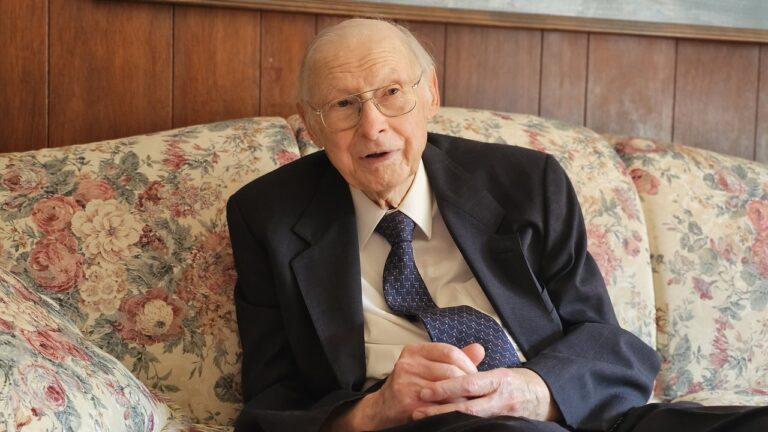Maximilian Krah is the top candidate of the German right-wing Alternative for Germany (AfD) party in the 2024 European Parliament elections. He has held the position of Member of the European Parliament (MEP) since 2019 and is affiliated with the political group Identity and Democracy. He visited Hungary on the invitation of the 21st Century Institute. In an interview with Hungarian Conservative, he discussed the prospects of the AfD and the European right in the upcoming EP elections.
***
The Alternative for Germany (AfD) has grown in recent months to become Germany’s second-largest party. However, the fascist scandal surrounding the party is intensifying. In light of these events, how do you perceive the prospects for the European Parliament elections this summer?
I don’t think that this will really hurt us. Take a look at what other real problems people in Germany are facing. They are experiencing economic decline, fearing the next heating costs bill, dealing with inflation, worrying about their jobs, and witnessing the influx of hundreds of thousands of immigrants. Demonstrations against the opposition clearly won’t change any of these problems. That is why I believe this is just a temporary wave that will pass, but
the problems caused by misguided politics will persist, and the solution to these issues is AfD.
The current scandal may perhaps cost us one or two per cent in the polls, and this is only true in Western Germany. Eastern Germans are so seasoned by their experiences under the communists that they don’t even believe what they hear on state television. In two or three weeks, the protests will likely subside, but the underlying problems will remain.
Nevertheless, there is an escalating discourse regarding the potential prohibition of the party. Do you see this as a genuine threat?
Indeed, there is increasing discussion about banning our party, but when you examine our support, it becomes evident that such a move would backfire. In the eastern part of the country, there are areas where our support exceeds thirty per cent, and in the western provinces, we remain stable between 20 and 25 per cent. Suppose the party were banned. This would mean depriving one-third of East Germans and about one-quarter of the electorate in Germany as a whole of their political representation—all in the name of democracy. If you were to do that, a very high number of German citizens would lose their trust in the democratic institutions. However, all democracies are not based on state repression but on trust in the institutions. I don’t think that the government is so foolish as to destroy the trust in the institutions themselves. I see a threat, but I don’t think that threat is so great and real that it would in any form influence our political actions.
According to the media, experts, and politicians, this year could witness the long-awaited right-wing shift in Europe. Do you perceive a substantial possibility of this occurring?
We will probably have a majority in the EP, with the European People’s Party, the Christian Democrats, the European Conservatives and Reformists, we call them the moderate conservatives, and us, the Identity and Democracy. The first problem is we cannot call the EPP a right-wing party. When you look at the Christian Democrats in Germany they are just like the Greens, they have a coalition with the Greens in six German federal states, and most of my EPP colleagues could be Green MEPs as well and vice versa.
The Christian Democrats are fake conservatives.
The second problem is that we still have two different ways of understanding what conservatism means. We, the ID want to go back to the roots and have a strategic autonomy of Europe because we think Europe has to go its own way and should not act as the junior partner of the United States. On the other hand, especially in the ECR, we also have those who do not want any strategic autonomy of Europe at all. According to this concept, there should be only small nation-states, and all of them shall be the vessels of the United States. They want to give major parts of our sovereignty to the US. We think it’s not a good idea, as we can see clearly in the example of Ukraine. This issue set a very fundamental question on the future direction of Europe, still, we have two opinions among the right-wing camp.
A prominent figure of the Italian right, Matteo Salvini, has long aspired to establish a comprehensive European right-wing party, uniting the genuinely conservative forces of the continent. Based on your last answer, it appears that you do not envision a significant likelihood of that materializing.
I would hope for the formation of a major right-wing group, but politicians should be realistic rather than dreamers. Due to differences, especially in some foreign policy issues, such a supergroup is unlikely—though not impossible. I am always open to discussions with all parties, but the more probable outcome is that the two groups will collaborate in areas where they share common ground, such as gender, family, and fiscal discipline. However, if you have a supergroup without unity on crucial matters like peace and war—arguably the most significant issues—what is the benefit of such a group? Effective policymaking requires at least some agreement on the most important issues. Whether it’s entering into conflict with Russia, engaging in an economic war against China, or possibly sending weapons or even soldiers to Taiwan, these are questions where members should not be in completely different camps. With that being said, I believe a supergroup could be possible if everyone involved is willing, and AfD would be part of that process, but it’s unlikely.
If we are discussing the European right, Fidesz is the party that cannot be overlooked. However, since 2021, it has not been a member of any EP political group. Could a more extensive collaboration between, for example, the AfD and Fidesz emerge in the next term?
This is only up to Fidesz.
We would not throw Fidesz out of our bed, but they have to come.
Fidesz and AfD share more or less the same approach to politics. However, I understand their perspective. The German industry stands as the largest foreign direct investor in Hungary. Given the close ties between German industry and the German government, which strongly opposes AfD, potential challenges may arise if the Hungarian government party aligns itself with AfD within the same group. That’s an argument I don’t like but I have to accept. It’s up to Fidesz to define their position, once again, they are very welcome.
Under the Fidesz government, Hungary has become an increasingly appealing destination for Germans, as indicated by social media and press reports, which suggest a growing number of individuals choosing the country as their new home. What are the factors contributing to this trend?
First of all, when you live in certain areas of Western Germany and you go to the street, you go to the city centre, you don’t have the impression of being in Germany anymore. People, especially those who are retired, would like to enjoy their pensions in a town that doesn’t look like some Middle Eastern town. It is the negative impact of non-European immigration—in terms of crime, public services, and how a city looks—, that leads there. Another factor is that the economic development in Germany is declining. We don’t have enough doctors, we have shortages in medicine, we have sharply rising rental prices for housing et cetera.
Hungary is quite stable in this sense.
Housing is affordable, especially outside of Budapest, the medical system is working, and the crime rate is low. Hungary offers a decent life without fear for its citizens and the people who live here. A decent life without fear is exactly what many Germans are looking for. I would argue that you cannot find your inner satisfaction outside of home. What is home? Home is where you don’t have to explain yourself. I would say that we shouldn’t give up and fight for our own country. But when you are 65, you fought your whole life and now it’s time to calm down, Hungary is clearly a good alternative. Usually, Germans are quite decent neighbours, they are not criminals, and they bring money to the country, so it’s a good deal for Hungary as well.
Related articles:








